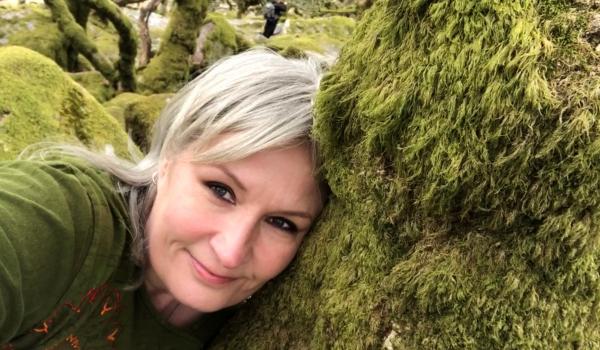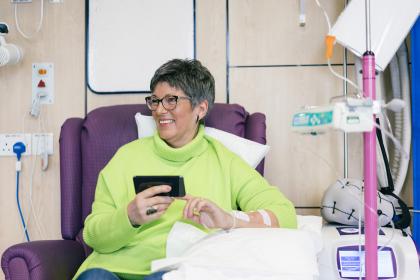When Diane's consultant told her that the tumour in her ovary was borderline, everyone expected her to feel relieved. After all, it wasn't 'full-blown' cancer. Instead, Diane felt more alone than ever. Here she talks about her path to diagnosis, borderline ovarian cancer and why, despite some setbacks, she refuses to give up hope…
After the surgery, the consultant came to the ward to tell me I had ovarian cancer. As my sister drove us all home I remember how blue the skies were and how beautiful the sunshine was. "What a lovely day to be told I've got cancer" I said – and we ended up laughing all the way home. Life had changed in a split second – and yet everything remained so normal.
Burning the candle
A few years ago, after a tumultuous few years in my life, I met my partner who is now my husband. It was a magical year; we were madly in love and we couldn't believe our luck at our age.
A few weeks before Christmas of the same year I woke with sudden pain in my lower back and abdomen. It kept me awake most of the night but subsided with no obvious explanation. Being a nurse, I wouldn't normally see my GP unless I absolutely had to, but this pain bothered me. I just felt something was not right. I had suffered for many years with constipation but it was more troublesome of late and I felt more bloated than usual. I'd also noticed that I felt increasingly tired come the winter months. I guess at the age of 49 I was burning the candle at both ends.
My GP tried to reassure me but I still felt that the possibilities she put forward didn't justify the intensity of pain I'd experienced. She arranged for an ultrasound, which showed a small cyst on my ovary. My blood tests also revealed that my CA125 level was quite raised. Although I was fast tracked to the gynae team, the consultant categorically stressed to me that he thought this was a haemorrhagic cyst. I should have felt reassured by his words, but funnily enough I didn't. The 'cyst' was removed through a laparoscopic procedure and after surgery the consultant came to the ward to tell me I had ovarian cancer.
Bereft
I had a laparoscopic hysterectomy and removal of ovaries and omentum. The histology results were a long time coming, but when we received the news it wasn't what we had expected. Suddenly my diagnosis changed and I was told I had borderline ovarian tumours and that I wouldn't need chemo. This created so much confusion for me and everyone else because we'd been prepared for one thing and it turned out to be something different. Borderline is a tricky disease because it's not full blown cancer but it's not not cancer either. Suddenly everyone around me seemed to be relieved because it wasn't as serious as first thought – everyone except me. I just felt pretty bereft and not much like myself at all.
Recurrence
Just under a year later, during a routine follow up I explained that I was again experiencing bloating and constipation. I was told it was highly unlikely to be anything to worry about, especially as the CA125 blood test was normal, but I insisted that I didn't feel that all was well. CT scans revealed an enlarged lymph node that had been missed during surgery. I had that removed and again was reassured that it looked like healthy tissue and nothing to worry about. The histology said otherwise and I was diagnosed with low-grade serous ovarian cancer. I really wasn't surprised. I started six cycles of carboplatin and paclitaxel chemotherapy, and a few weeks later my hair began to fall out. My partner cut my beautiful dreadlocks off for me and shaved my head. He helped me a great deal at this time because he also shaved his hair off in support of me.
Retirement
Once I completed my chemo I had to make the heartbreaking decision to retire from a 34-year nursing career due to ill health. To this day I still feel sad about that decision. It's not just cancer that we have to cope with but also a whole host of other life-changing challenges.
Eight months later the cancer was back and I recently discovered it has spread into my chest. I am now facing more chemotherapy and maintenance treatment.
My story
Although the disease has been relentless, I have never given up hope. Low-grade serous ovarian cancer is rare and so the resources available are scarce and the treatment options vary from country to country. Using credible websites is essential when looking for information. I would tell any woman with ovarian cancer to use the support and resources locally and nationally because they really do help you and your loved ones get your head around what's going on. I would also advocate that all women trust their instinct. If you sense something is not right, please make sure you tell your doctor and don't stop until you get answers. You know your body better than anyone else.
Finally, I just want to say that you can live life with cancer. Never feel alone and never give up hope.
If you’ve been affected by this story and would like to speak to a specialist nurse, you can call our dedicated support line on 020 7923 5475 or contact us: [email protected]. We're open from 9am until 5.30pm, Monday to Friday.





